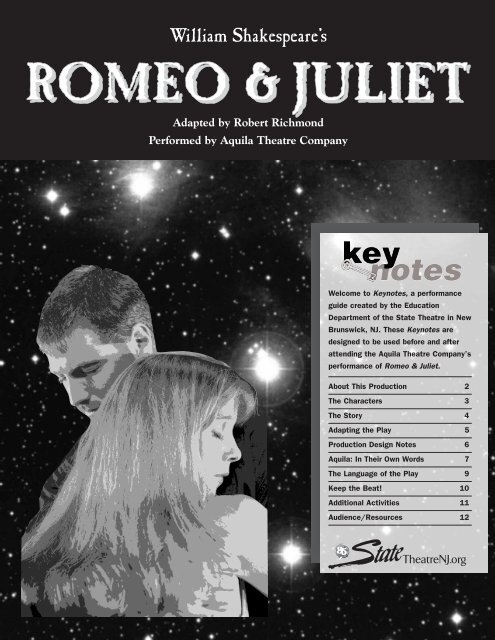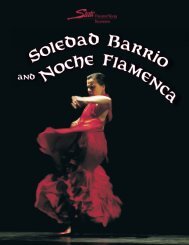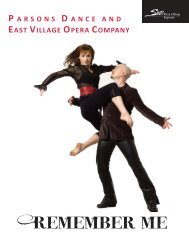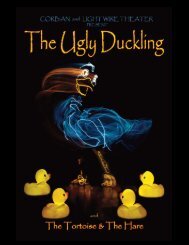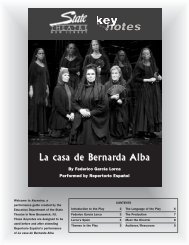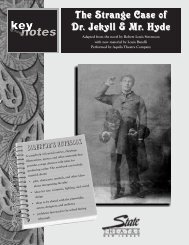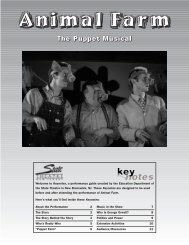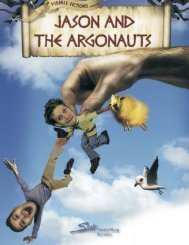Romeo & Juliet - State Theatre
Romeo & Juliet - State Theatre
Romeo & Juliet - State Theatre
- No tags were found...
Create successful ePaper yourself
Turn your PDF publications into a flip-book with our unique Google optimized e-Paper software.
The Characters 3“A plague o’ both your houses!”ESCALUSPrince of Verona (an actual town in Northern Italy).Angry about the ongoing feud between theCapulets and Montagues, he warns that anyonecaught fighting will be put to death.MERCUTIOA relative of Prince Escalus and a good friend of <strong>Romeo</strong>’s.He has a quick temper and clever way with words. He isespecially fond of jokes and puns with a sexual meaning. Hedoes not have much patience for <strong>Romeo</strong>’s romantic daydreams.HOUSE OF MONTAGUEPARISA young nobleman, a relative of Prince Escalus.When he becomes engaged to <strong>Juliet</strong>, he behavesas if she is already his wife.HOUSE OF CAPULETMONTAGUEHead of a noble family of Verona, bitterenemy of the Capulets.In the beginning of the play, he is worriedabout his son <strong>Romeo</strong>’s melancholy mood.ROMEOTeenage son of Lord and Lady Montague.When we first meet him, he is in love withRosaline, but then he falls in love at firstsight with <strong>Juliet</strong>. He resists becominginvolved in the violent feud between his familyand the Capulets, fighting only when forced todefend himself or avenge his friend.BENVOLIO<strong>Romeo</strong>’s cousin and friend.MissingPersons?If you’ve already read theplay, you may notice somecharacters (including LadyMontague and the servants)don’t appear on the chart.Aquila decided to leavethese characters out of theirproduction. As you watchthe performance, try todecide whether this helps orhurts your understanding ofthe story.CAPULETHead of a noble family of Verona,mortal enemy of the Montagues.At first, he is protective of hisdaughter <strong>Juliet</strong>’s happiness, butwhen she refuses to marry Parishe becomes enraged at her.9FRIAR LAURENCEA Franciscan priest (a member of aCatholic brotherhood founded by St.Francis of Assisi).He hopes to help end the feud betweenthe Capulets and Montagues by secretlymarrying <strong>Romeo</strong> and <strong>Juliet</strong>.APOTHECARYAn apothecary mixes and sells drugs andother medicines. This one supplies thepoison that <strong>Romeo</strong> uses to kill himself.LADY CAPULET<strong>Juliet</strong>’s mother, wife of LordCapulet.We find out that she herselfmarried at a very young ageand gave birth to <strong>Juliet</strong> whenshe was about 14.JULIETDaughter of Lord and Lady Capulet, not yet14 years old.Childish and innocent at the start of the play,she matures quickly into a strong-mindedwoman after she falls in love with <strong>Romeo</strong>.TYBALT<strong>Juliet</strong>’s cousin on her mother’s side.He’s quick-tempered and alwayslooking for a fight, especially againstthe Montagues.NURSE<strong>Juliet</strong>’s nanny, who breast-fed her whenshe was a baby and has taken care of herever since.She’s a talkative and sometimes vulgarwoman, but loyal to <strong>Juliet</strong>. Her view of loveis earthy and sexual rather than romantic.Did YouKnow...?Family feuds appear in lots of cultures,including American popular culture. Thinkof the feuding Corleone and Tattagliafamilies in The Godfather, or the Sharksand the Jets in West Side Story.
The Story 4“For never was a story of more woe / Than this of <strong>Juliet</strong> and her <strong>Romeo</strong>.”Act OneMembers of the rival Capuletand Montague familiesencounter each other in astreet in Verona. They fight.Prince Escalus decrees thatfrom now on, anyone caughtfighting will be put to death.Benvolio tells his uncle, LordMontague, that he will try tofind out what’s been botheringMontague’s son, <strong>Romeo</strong>.<strong>Romeo</strong> tells Benvolio that heis suffering from unrequitedlove for Rosaline.Lord Capulet consents to themarriage of his young daughter<strong>Juliet</strong> with Count Paris—butonly if she is willing. LadyCapulet tells <strong>Juliet</strong> that she willhave a chance to meet Paristhis evening at a party at theirhouse.Mercutio, <strong>Romeo</strong>, and Benvoliocrash the Capulets’ party.Tybalt recognizes <strong>Romeo</strong> but isforced by Capulet to endure hispresence. <strong>Romeo</strong> and <strong>Juliet</strong>dance together, exchangekisses, then discover that theycome from families who aresworn enemies.Act TwoAfter the party, <strong>Romeo</strong> returnsto Capulet’s garden. Mercutioand Benvolio search for him.<strong>Romeo</strong> sees <strong>Juliet</strong> at herbalcony window. They exchangevows of love and plan to marry.<strong>Romeo</strong> visits Friar Laurenceand tells him that he loves<strong>Juliet</strong>. Hoping that their unionwill help end the feud betweentheir families, the Friar agreesto perform the marriageceremony.Mercutio and Benvolio meet upwith <strong>Romeo</strong>. Mercutio and<strong>Romeo</strong> have a battle of wits.The Nurse arrives, looking for<strong>Romeo</strong>. When his friends haveleft, <strong>Romeo</strong> instructs the Nurseto have <strong>Juliet</strong> meet him at FriarLaurence’s to be married.The Nurse returns and tells<strong>Juliet</strong> about the wedding plans.<strong>Juliet</strong> goes to Friar Laurence’scell, where <strong>Romeo</strong> and theFriar are waiting. They go off tobe married.Act ThreeBenvolio and Mercutio meetTybalt in the street. When<strong>Romeo</strong> arrives, he refusesTybalt’s challenge. Mercutiofights Tybalt and is killed. Inrevenge, <strong>Romeo</strong> kills Tybalt,then flees.Waiting in her garden, <strong>Juliet</strong>looks forward to seeing<strong>Romeo</strong>. The Nurse arrives andtells <strong>Juliet</strong> that Tybalt is deadand <strong>Romeo</strong> banished fromVerona for the murder.Back at Friar Laurence’s cell,the Friar tells <strong>Romeo</strong> thatPrince Escalus has sentencedhim to banishment instead ofexecution. The Nurse arrivesand tells <strong>Romeo</strong> to come to<strong>Juliet</strong>’s room that night.Capulet reassures Paris thathis wedding to <strong>Juliet</strong> will takeplace soon, despite the slayingof <strong>Juliet</strong>’s cousin Tybalt.At dawn, <strong>Romeo</strong> leaves <strong>Juliet</strong>’sbedroom. Lady Capulet comesin to inform <strong>Juliet</strong> that she is tobe married to Paris in a fewdays. <strong>Juliet</strong> refuses. Capuletarrives and threatens to disownhis daughter if she does notmarry Paris.Act Four<strong>Juliet</strong> goes to Friar Laurence forhelp and meets Paris. Parisleaves, believing that he and<strong>Juliet</strong> will soon be wed.Friar Laurence gives <strong>Juliet</strong> apotion that will allow her tofake her own death. The Friarwill send a note telling <strong>Romeo</strong>to go to <strong>Juliet</strong>’s funeral cryptand wait for her to awaken. Thetwo can then escape togetherto Mantua.<strong>Juliet</strong> returns home and asksher father for forgiveness,promising to marry Paris. Leftalone, she takes the potionand falls into a stateresembling death. In themorning, the Nurse tries towaken <strong>Juliet</strong> and finds herseemingly dead.Act FiveBenvolio visits <strong>Romeo</strong> in exilein Mantua and tells him that<strong>Juliet</strong> is dead. <strong>Romeo</strong> buyspoison from an apothecary andplans to return to Verona to dieat <strong>Juliet</strong>’s side.The Friar learns that <strong>Romeo</strong>never received his letter tellinghim that <strong>Juliet</strong> is not reallydead. He rushes off to thecemetery, hoping to get therebefore <strong>Romeo</strong>.Paris visits <strong>Juliet</strong>’s grave. When<strong>Romeo</strong> arrives, Parischallenges him and is killed.Believing <strong>Juliet</strong> to be dead,<strong>Romeo</strong> takes the poison. <strong>Juliet</strong>awakens, finds <strong>Romeo</strong> dead,and kills herself.
Adapting the Play 5In bringing a play to life onstage, the director and the creative team often decide to adapt the material—makechanges in the text, setting, or other aspects—to make it work within a particular set of conditions. Aquila <strong>Theatre</strong>comments on some of the choices they made in bringing their vision of <strong>Romeo</strong> & <strong>Juliet</strong> to the stage.• CHANGES IN THE TEXT - Some portions of the play have been cut, a commonpractice in staging Shakespeare today. (For example, this production ends with <strong>Juliet</strong>’swords, “This is thy sheath; there rust, and let me die,” and leaves out the final sceneof reconciliation between the Capulets and the Montagues.) Additional sections of thetext may have been moved or assigned to another character.We strongly believe that you should never cut something merely because youdon’t understand it. But with no cuts, <strong>Romeo</strong> & <strong>Juliet</strong> would take well over 3hours to perform. We tried to trim the script down to a time frame that ispractical for a modern audience, without losing any essential parts of the story.Our version runs about 2fi hours, including intermission.• DOUBLING (AND MORE) - There are six actors in this production, though there aremore parts than that in the play. In adapting the play for the available cast, somesmaller roles have been cut, while in other cases an actor will “double”—take on morethan one role. (The actor playing Mercutio also plays Escalus, the Nurse, and Paris;the other character “tracks” are Tybalt/Friar Laurence/Lord Montague; Benvolio/LadyCapulet; and Lord Capulet/the Apothecary.)Doubling the smaller roles gives more to do for the actors who are not playing alead part. It also challenges those performers to come up with a distinctive way ofmoving and speaking for each of their characters so the audience does not getconfused. And often, it challenges them to play against type and even gender.POST-SHOW DISCUSSION• Did you notice which linesand characters were missingin Aquila’s <strong>Romeo</strong> & <strong>Juliet</strong>?• Do you think the cuts helpedor hurt the play? Why? Did itchange the meaning of thestory? If so, how?• Which lines and characters(if any) would you put back?POST-SHOW DISCUSSION• Did you notice the actorswho played more than onerole?• How did they use theirvoices and bodies to createthe different characters?• Did the costumes help youdistinguish one characterfrom another?Same Words, Different VisionsWith your classmates, watch three different film versionsof the same scene from the play (for example, Act III,scene v, where <strong>Romeo</strong> and <strong>Juliet</strong> must part after theirwedding night). Discuss the differences among the threefilms and Aquila <strong>Theatre</strong>’s staging. Ask yourselves:• Which version did you think was most effective? Why?• What were some of the different choices that thedirectors and actors made about how to play the scene?• In each production, what time period and location did thesets and costumes indicate?• Was there any music? If so, what effect did it have on theperformance?• What was different about watching the play on film vs. seeingit performed live onstage?<strong>Romeo</strong> & <strong>Juliet</strong> on film(clockwise from upperleft: Olivia Hussey &Leonard Whiting (1968),Leslie Howard & NormaShearer (1936), ClaireDanes & LeonardoDiCaprio (1996)
Production Design Notes 6This is our ENTIRE set: aneight-sided wooden platform,about a foot high. It comesapart in sections to fit easilyinto the touring truck.Chairs on each sideof the stage. Actorsare seated whennot in the scene...They can do soundeffects from here.This section of platformdetaches to become<strong>Juliet</strong>’s balcony, coffin, etc.Tony,We’ve decided that we wantthe music and sound effects inour production to be performedlive, rather than recorded. Whatkinds of simple instruments canwe use to create an appropriateatmosphere? In a few keyplaces, we were thinking aboutunderscoring the spoken textwith singing. And there’s oneplace in particular that seems tocall for a song. Can you composesomething extra-special for us?—PeterThe Aquila <strong>Theatre</strong> CompanyMegan—We’ve given you quite a challenge in creating the costumes for our<strong>Romeo</strong> & <strong>Juliet</strong>. Here are the problems you’ll need to solve:• At any performance, our six actors (two women and four men) haveto be ready to perform any of the roles in the play. On our budget,there’s no way we can afford to build costumes for six possible<strong>Romeo</strong>s, six possible <strong>Juliet</strong>s, six possible Tybalts, etc. Anyway, we’dnever be able to fit all that wardrobe in the tour truck!• Additionally, at each performance some of the actors will beplaying two or three different roles. They may have less than aminute to change from one character to another. And some ofthe changes will be in full view of the audience.• Depending on the luck of the draw, the male actors could beplaying women and the female actors will almost certainlyhave to play men. We need to make sure the audiencedoesn’t get confused about who’s who in our play. At thesame time, we want the audience to be able to acceptKenn or Louis or Andrew or Jonathan as Lady Capuletor even <strong>Juliet</strong>, without bursting into hysterical laughter.• Our set design is very simple—we’d like the costumes tobe that way, too. The style should suggest Shakespeare’stime without being too fussy or literal.• We’re picturing a limited color palette—perhaps coffee andcream?—but we’re open to discussion on this. Can’t wait tohear your ideas!—Peter & RobertDid YouKnow...?In Shakespeare’s time, even the grandestproductions had very simple sets.Settings were created mostly throughShakespeare’s descriptive language andthe audience’s imagination.What are some possible waysyou could solve the uniquecostume-design challengesthat this productionpresents? Illustrate yourdesign ideas with originalsketches, or imagespulled from magazines orthe internet.After you’veseen theshow, discuss Aquila’sdesign choices. Did theyallow the actors to makesmooth and clear transitionsfrom one character toanother? What about thechoices they made about hairand makeup?
Aquila: In Their Own Words 7Two members of Aquila <strong>Theatre</strong>’s <strong>Romeo</strong> & <strong>Juliet</strong> company, Louis Butelli (LB) and Lindsay Rae Taylor (LRT), alongwith director Robert Richmond (RR) spoke to the <strong>State</strong> <strong>Theatre</strong> (ST) about the process of creating their unusualproduction and the challenges and rewards they’re discovering as actors in the ensemble.ST:RR:ST:You've used a smaller ensemble, a simpler set andlighting design, and less music than we've come toexpect from Aquila. What drove these decisions?This past summer Aquila performed at the Globe <strong>Theatre</strong>in Nuess, Germany. Our experience working in areconstruction of Shakespeare’s original theater gave usall a greater understanding of the original conditions thatthe play would have beenperformed in. We came to realizejust how much the audience at theGlobe is present. They cannot beignored. Indeed, the more oneacknowledges their presence inthe drama, the more successfulthe show. The visual and soundelements in our <strong>Romeo</strong> and <strong>Juliet</strong>are designed to increase theintimacy between actor andRobert Richmondaudience.Tell us about the process Aquila used in this production.LRT: During rehearsals, we spent a lot of time as a groupdiscussing each character. There was much debate as towhether or not to color the characters in broad strokes,(meaning, for example, if you are a woman playing aman, do you walk with a wide stance, deepen your voice,etc.) This was the most difficult part of the process, andwe are still working through it. We each found our wayinto a character from a physical point, either a posture orgesture, and are now allowing ourselves to let that goand trust what is going on with the character internally.ST:LB:Did you all come to an agreement about each of thecharacters in the play so that you’d be on the “samepage” no matter who was playing which role?While we sought a sort of consensus about who thecharacters “are” exactly, we found that the best personto consult, centuries later, remains the author.Shakespeare drew such incredibly clear characters; eachone has their own unique speech pattern, thoughtprocess, sense of logic, charisma, and objects ofobsession, all hard-wired into the words Shakespearegave them to speak. Whether <strong>Juliet</strong> is being played by apetite young woman or a bald man with a beard, theplaywright reminds us that she is a 13-year old girlcaught in the throes of a first love; that she’s veryST:intelligent and hyper-articulate—she can run verbalcircles around <strong>Romeo</strong>.We did not decide that each <strong>Romeo</strong> should say “But soft!What light through yonder window breaks,” in a particularway every time. But we did decide, for the sake of unity(and safety!), that he should probably stand in a similarplace every time, no matter who was playing him.Which role(s) are you finding most difficult? Easiest?LRT: I find playing the men very difficult. Benvolio has been amajor challenge for me, because he is not a very clearlydefined character. I find it hard to make him interesting.He is very male, more so than any of the other boys, soas a female, that is a big challenge for me. At themoment, I probably enjoy playing <strong>Juliet</strong> the most,perhaps because she it the character that I mostconnect to. She is very rich, but has quite a toughjourney, which has been incredibly challenging, as well.LB:Ironically, both the most difficult and the easiest role forme are assigned to the same character “track.” Thismeans that when I play either one, I play them both onthe same evening. My most difficult role is the Nurse,and my easiest is Mercutio.The most obvious difficulty with playing the Nurse is thatshe is physically sodifferent from me. Thatsaid, Shakespeare givesus very specific clues asto what she mightactually be like and howto play her. She is agreat chatter-box with aself-deprecating senseof humor. She iscontinually making jokesand off-color remarksabout sex. Herenthusiasm andquirkiness areinfectious, and she is allthe more tragic forhaving started out atsuch an entertaininghigh.Louis Butelli as Feste in Aquila<strong>Theatre</strong>’s Twelfth Night
The Language of the Play 9Ever wonder why so many famous quotations seem to come fromShakespeare? Language is the most important element in his playsand one of the main reasons they have endured for more than 400years. When performed by skilled actors, Shakespeare’s inventivewords and poetic imagery—more than any other element of theproduction—bring his stories to life.Though language is often what draws people to Shakespeare, itcan also be the biggest obstacle to enjoying his plays. After all,nobody speaks “Elizabethan” anymore. But if you do a littlehomework and become familiar with the plot and characters, youshould be able to follow the story even if you don’t alwaysunderstand what the characters are saying. The next step is togo back to the text and apply what you have learned about the play.Some parts may still be confusing, but others will become clearer,until eventually you should be able to understand all or most of it.?SayWHAT!? !Making sense out of Elizabethan language is easy if you learn somebasic vocabulary. Here is a list of words from <strong>Romeo</strong> & <strong>Juliet</strong> you shouldbe familiar with before you see the show.AN, AND - ifANON - soonATTEND - listen toAYE - yesBESEECH - begBUT - only, exceptCOUNSEL - adviceDECREE - orderDIGNITY - rank, classDISCOURSES - speaksDISPATCH - killDOFF - take off; removeERE (pronounced ‘AIR’) - beforeHAPLY - perhapsHAPPY - fortunate; luckyHEAVY - sad, depressedHENCE - away from hereHIE - hurry, goHITHER - hereMARK - pay attention toMARRY - an exclamation of surpriseMORROW - morning; tomorrowNAY - noNE’ER (pronounced ‘NAIR’) - neverNOUGHT - nothingPEEVISH - irritable; complainingPLAGUE - cursePRAY - begRESOLVE - planRUNAGATE - fugitive; runawaySOFT - wait a minute; hold onSTAR-CROSSED - ill-fatedTHOU, THEE - youTHITHER - thereTHY, THINE - yourTIDINGS - newsWHENCE - whereWHEREFORE - whyWILL - desireWILT - will, will youWITHAL - in addition, besidesWOE - miseryWOO - pursue romanticallyWOULD - wishMarry, <strong>Juliet</strong>, I did notrealize “Wherefore”means “why”!Dear Diary...Did you sayMARRY!?!Put yourself in the shoes of a characterfrom <strong>Romeo</strong> & <strong>Juliet</strong>. Explore the text forclues to what this character is like andwhat he or she is concerned about. Lookat their words, their actions, and alsowhat the other characters say about them.As your character, write a journal entrydepicting a day in your life as well assummarizing some of the events in theplay from that character’s perspective.Use at least 5 words from the vocabularylist on this page. While writing in yourjournal, think about:• Who are you? What do you look like?How do you act?• How do you feel about the othercharacters? Who is your strongest ally?Who is your enemy?• Were you involved directly with theaction in a particular scene? If not, howdid you hear about the events thattranspired? What was your reaction?
Keep the Beat! 10Speaking from the HeartIambic PentameterShakespeare’s plays are written mostly in a poetic style callediambic pentameter. Iambic pentameter is a line rhythm made upof 5 iambs (EYE-amb). One iamb has two beats or syllables: anunstressed beat followed by a stressed beat. A line written iniambic pentameter contains 10 beats (1 iamb x 2 beats x 5 = 10beats). The rhythm alternates unstressed and stressed beats: dah-DUH, dah-DUH, dah-DUH, dah-DUH, dah-DUH. If you’re reading linesof iambic pentameter correctly, the rhythm sounds like a heartbeat.Look closely at the lines below from <strong>Romeo</strong> & <strong>Juliet</strong>. First, readthe stressed words aloud. Then read only the unstressed words.But soft! What light through yonder window breaks?It is the East, and <strong>Juliet</strong> is the sun!Arise, fair sun, and kill the envious moon,Who is already sick and pale with griefThat thou her maid art far more fair than she.Notice that the most important words are the ones that arestressed. This makes the language easier to understand. WheneverShakespeare breaks the rules—by adding or subtracting syllablesor putting the stress in an odd place—it’s because he wants to callattention to something unusual in the story. Keep your ears tunedfor these changes during the performance!Why do you suppose Shakespeare wrote in iambic pentameter?Rappin’With WillSuppose <strong>Romeo</strong> & <strong>Juliet</strong> was beingperformed in a modern setting andstyle. Write a rap song for one of thefollowing:• The opening speech by the Chorusintroducing the play to theaudience• Mercutio’s “Queen Mab” speech• <strong>Romeo</strong> and <strong>Juliet</strong>’s meeting at theCapulets’ party• Friar Laurence telling Escalus whathappened to <strong>Romeo</strong> and <strong>Juliet</strong>Working with a partner or two (oneperson as your “beatbox”), performyour rap for the rest of the class.Thinking MetaphoricallyAnother feature of Shakespeare’s language is his use of metaphor—using a word or words to represent something entirely different. Forexample, <strong>Juliet</strong> says to <strong>Romeo</strong>, “Thou knowest the mask of night ison my face.” Of course, she’s not actually wearing a mask; shemeans that the darkness of night is hiding her face like a mask.Can you build a metaphor comparing <strong>Romeo</strong> & <strong>Juliet</strong> to a sandwich?Create an R&J Sandwich, complete with recipe, illustration andinstructions. Some questions to guide your creation:• What kind(s) of bread would you use? Would you toast it? Whatwould be in the middle of the sandwich?• What does your sandwich taste like? Does it taste like the play feels?What other metaphors can you think of that could be used to describethe play, its themes, or characters?
Additional Activities 11CAPULETSVS..MONTAGUESFamily Feud Meets Jeopardy— Verona Style!First, establish a list of categories pertaining to <strong>Romeo</strong>& <strong>Juliet</strong>: characters, plot, vocabulary, etc. Under eachtopic, create a list of questions and their answers. Next,assign a dollar amount to the answers within each topic.Divide your class into Capulets and Montagues. Yourteacher will serve as the host/moderator. Threestudents from each family will face off at the front of theroom, while team members rotate from their desks.Teams work collectively to respond, with responsesphrased in the form of a question. Ex. “What is Verona?”The family with the most money wins the feud!IN THE HOT SEATPut yourself in the role of one of the charactersin <strong>Romeo</strong> & <strong>Juliet</strong>. You can even choose to bea character who has died. Take a seat infront of the class—this is the“hot seat.” Let yourclassmates ask your characterquestions about who you are,why you acted as you did, how you feltabout the situation, and what you havelearned from your actions.The Perfect Mate?In <strong>Romeo</strong> & <strong>Juliet</strong>, Shakespeare shows that teenagers and their parents have verydifferent ideas about what makes a perfect mate. Do you think things havechanged 400 years later?Create a two-sided survey form. One side is for you to fill out, the other is for yourparent/guardian to complete. (The questions are at the right.)Fill out your side of the survey first. Then take the form home and ask your parentsto fill out their side, without looking at your answers. When all the surveys arecompleted, appoint a group to compile the answers and then report back to theclass. Did you find differences between: a) What students want in a mate and whatparents would want? b) What students think their parents want for them versuswhat parents really want for their children? c) What parents think their childrenwant for themselves and what students really want for themselves?STUDENT QUESTIONS1. If you had to list the traits (physical,personality, etc.) of your perfect mate,what would they be? Be specific.2. What traits do you think YOURPARENTS would list if they werechoosing the perfect mate for you?PARENT QUESTIONS1. What specific traits (physical,personality, etc.) would you considermost important if you were choosing theperfect mate for your child?2. What traits do you think YOUR CHILDwould condsider most important if theywere choosing the perfect mate forthemselves?
Audience/Resources 12Do You Know Your Part?As a member of the audience, you are a crucial part of theperformance. Before you arrive at the theater, make sure youknow your role!• When you enter the theater, follow an usher to your seat.• Once the house lights (the lights in the part of the theaterwhere the audience is sitting) go down, focus all yourattention on the stage.• Attending a live theater performance is not the same aswatching television at home. At the theater, talking, eating,or moving around disturbs the performers and othermembers of the audience. So watch and listen carefully tothe performance. And please no food or beverages!• Don’t bring cameras, camcorders, tape recorders, or anyother recording equipment to the performance. You willnot be allowed to use them.• If something in the play is funny, go ahead and laugh. Andof course, please applaud at the end of the performance ifyou liked what you saw!• After the performers are finished taking their bows, stay inyour seat until your group gets the signal to leave thetheater.Keynotes are produced by the Education Department of the <strong>State</strong> <strong>Theatre</strong>,New Brunswick, NJ.Wesley Brustad, PresidentLian Farrer, Vice President for EducationKeynotes written and designed by Lian Farrer© 2006 <strong>State</strong> <strong>Theatre</strong>Cover photo ©2006 Brown Cathell for Aquila <strong>Theatre</strong> CompanyThe <strong>State</strong> <strong>Theatre</strong>’s education program is funded in part by Bank of America, Bristol-Myers Squibb,Brother International Corporation, James and Diane Burke, the E & G Foundation, the Horizon Foundationfor New Jersey, Johnson & Johnson, the J. Seward Johnson Foundation, the Robert Wood JohnsonFoundation, the Karma Foundation, the John F. Kennedy Center for the Performing Arts, the Blanche andIrving Laurie Foundation, the McCrane Foundation, the Mid Atlantic Arts Foundation, National Starch andChemical Company, the PNC Foundation, Verizon, and the Wachovia Foundation. Their support is gratefullyacknowledged.Funding has been made possible inpart by the New Jersey <strong>State</strong> Council onthe Arts/ Department of <strong>State</strong>, apartner agency of the NationalEndowment for the Arts.Continental Airlines is the officialairline of the <strong>State</strong> <strong>Theatre</strong>.ResourcesBOOKS:The Friendly Shakespeare : A Thoroughly PainlessGuide to the Best of the Bard, by Norrie Epstein.Penguin USA, 1994.<strong>Romeo</strong> and <strong>Juliet</strong> (Cambridge School Shakespeare),by William Shakespeare, edited by Rex Gibson.Cambridge University Press, 1998The World of Shakespeare, by Anna Claybourne &Rebecca Treays. Usborne, 2001WEBSITES:Absolute Shakespearewww.absoluteshakespeare.comArtsEdge: Discovering <strong>Romeo</strong> and <strong>Juliet</strong>http://artsedge.kennedycenter.org/exploring/randj/artsedge.htmlAquila <strong>Theatre</strong> Companywww.aquilatheatre.comFolger Shakespeare Librarywww.folger.edu/<strong>Romeo</strong> and <strong>Juliet</strong> Navigatorwww.clicknotes.com/romeoThe Shakespeare Resource Centerwww.bardweb.netWilliam Shakespeare Biography (and more)www.william-shakespeare.org.uk/index.htmVIDEO:<strong>Romeo</strong> + <strong>Juliet</strong> (1996), starring Leonardo DiCaprioand Claire Danes, directed by Baz Luhrmann. Amodern re-telling of the story using Shakespeare’stext. (rated PG-13)<strong>Romeo</strong> and <strong>Juliet</strong> (1968), starring Leonard Whitingand Olivia Hussey, directed by Franco Zeffirelli (ratedG)<strong>Romeo</strong> and <strong>Juliet</strong> (1976), starring ChristopherNeame and Ann Hasson, directed by Joan Kemp-Welch (not rated)<strong>Romeo</strong> and <strong>Juliet</strong> (1936), starring Leslie Howard andNorma Shearer, directed by George Cukor (not rated)Shakespeare: A Day at the Globe. GuidanceAssociates Video, 1990William Shakespeare: A Life of Drama. A&ETelevision Networks, 1996


